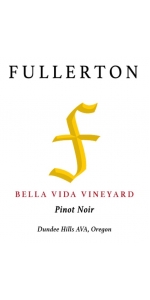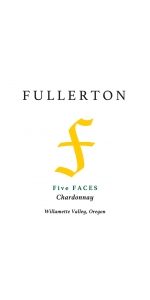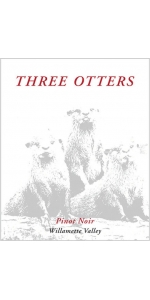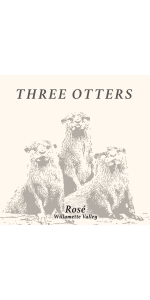Wine from Fullerton Wines
Great wine speaks profoundly, a universal language transcending any one culture. Hailing from northern Europe, the Fullerton family speaks many languages, and delights in sharing the language of wine with others. Fullerton Wines crafts elegant and distinctive Pinot Noirs and Chardonnays that transport you to their place, Oregon’s Willamette Valley.
A family of enophiles, the Fullertons can trace their love of wine to Eric, who was first introduced to wine growing and production during his teenage years when he worked as a cellar hand in Germany (a story in and of itself). A few years later, his best friend in Denmark inherited an impressive cellar of Bordeaux and Burgundy wines. Together, they sought younger bottlings of the cellared wines, and held vertical tastings. Their interest in wine grew, and they began traveling throughout France discovering new producers to fuel their expanding passion.
When Eric and Susanne met in Stockholm, it did not take long for Susanne to fall in love with Eric and the wines he respected. Marriage soon followed, and they continued tasting, savoring, and cellaring wine.
In 2010, Alex Fullerton graduated from the University of Oregon with an Economics degree. Alex and Eric were tasting wine at Penner-Ash Wine Cellars, and began discussing home-brewing and the process of fermentation. The conversation led to the idea of Alex making wine. A couple of minutes later, Lynn Penner-Ash entered the room, and Eric asked her how Alex could enter the industry. Coincidentally, a harvest intern had dropped out that morning, and she needed a replacement. The next day Alex was offered a job as an intern, and later became a cellar hand at Penner-Ash. His passion ignited.
Alex next took off to New Zealand to work at Drylands Winery in Marlborough. Although the experience didn’t align with the handcrafted winemaking tradition in Oregon, he came back determined to learn more about growing and production. Penner-Ash welcomed him back again for the 2011 harvest, and he worked the following 2012 harvest at Bergström Wines under winemaker Josh Bergström. Lynn Penner-Ash and Josh Bergström both mentored and inspired Alex, deepening his knowledge of winemaking.
Fullerton Wines began in a garage in 2011. Alex and Eric partnered with their good friend Roger Wallberg and made a few barrels of Pinot Noir. Despite the challenging vintage, the wine impressed and Fullerton Wines was born. Today, Fullerton Wines crafts treasured Willamette Valley wines, focused purely on the Burgundian varietals of Pinot Noir and Chardonnay.
Pinot Noir: 8,150 cases, Chardonnay: 2,000 cases, Pinot Gris: 1,000 cases and Syrah:150 cases
Alex Fullerton worked at Penner-Ash and Bergstrom in Willamette Valley, Oregon and Drylands in Blenheim, NZ majored in Economy @ UO, Studied Organic chemistry @ PSU and Viticulture & Enology @ OSU.
Vineyards: Ivy Slope (Estate) Chard, Croft PN, Fir Crest PN, Arbor Brook PN, Lichtenwalter PN, Bjornson PN, Momtazi PN, Ch Bianca Chard, Bella Vida PN, Apolloni PN, Bennett PN, La Velle PG, May's Vineyard Syrah.
Ivy Slope (Estate) 0.5 Acres All others by Acerage contracts.
Age of the vines: 7 - 50 years.
Everything is at a minimum Sustainable, Momtazi is Biodynamic and Croft is Organically certified.
Our holistic viticulture produces energetic fruit, great wine, and a healthier world.
Great wine requires great fruit. Growing high-quality grapes demands that we care for the soil in which the vines grow. Grapes, more than any other crop, convey the characteristics and health of their site. It is widely known that the best wines come from grapes grown in well-drained soils. Grape growers and winemakers are becoming increasingly aware of the devastating effects of synthetic fertilizers and herbicides on the structure, drainage, infiltration, and overall health of the soil. At Fullerton Wines, our pursuit of great wine guides us to organic and biodynamic farming methods because of its ability to build up healthy soils while also sequestering carbon into the soil (thereby helping to mitigate climate change). Through these methods, we improve the aggregate stability, drainage, water-holding capacity, and infiltration of the soils. We also reduce erosion and nutrient leaching.
Fullerton Three Otters Pinot Noir is made from 100% Pinot Noir - 40 years old
11 months in 25% new Oak and 75% neutral
Bella Vida Vineyard is perched high in the heart of the Dundee Hills. This picturesque site provides elegant fruit from the storied Jory soils of the AVA. LIVE certified.
Aromas of cherry and raspberry flow into finely-tuned layers of cedar, cocoa, licorice, and baking spices. The palate pulses with energy as the silky tannins and gorgeous mid-palate captivate your senses. A radiant and profound experience.
A co-fermentation of Dijon clones 113, 667, and 777, this wine expresses the volcanic soils of the Dundee Hills elegantly, yet powerfully. Upon arrival, the grapes were immediately de-stemmed into an open-top two-ton fermenter. Following a seven day cold soak, the wine started fermenting slowly at a cool temperature. To manage extraction, we utilized one to two punch-downs and one pump-over per day, with two rack-and-returns at the beginning and middle of fermentation. As fermentation neared the end, the must was heated to achieve a peak temperature of 94° F resulting in optimum extraction, and then we immediately chilled the wine to extend the time on the skins, while switching to one pump-over per day to limit harsh, seed-tannin extraction. After a total of 19 days on the skins, we drained and pressed the wine, keeping the free-run and press fractions separate. This bottling contains only the free run fraction. Following two days of settling, the wine was racked to barrel and aged for 11 months in 25% new French oak and one month in tank prior to being bottled unfined and unfiltered.
Review:
Vivid red. Displays fresh red/dark berry and pungent floral aromas, along with suggestions of cola, mocha and five-spice powder. Appealingly sweet and energetic on the palate, offering intense black raspberry, cherry-cola, spicecake and rose pastille flavors that tighten up slowly on the back half. Fine-grained tannins frame the well-defined finish, which lingers with impressive, red fruit liqueur-driven persistence. (all de-stemmed fruit and 25% new French oak). - Josh Raynolds" - Antonio Galloni's Vinous (June 2019), 93 pts
Fullerton Five Faces Chardonnay is made from 100 percent Chardonnay.
Five FACES is an acronym for the Fullerton family – Filip, Alex, Caroline, Eric, and Susanne. The wines blend fruit from multiple vineyards in Willamette Valley, mainly in the north of the valley with one to the west in the Van Duzer Corridor. A full representation of the Willamee Valley’s soil types is on display with one volcanic vineyard, two loess (windblown) vineyards, and two sedimentary vineyards. The vineyards range in elevation from 550-700 feet.
Honeydew melon, japanese pear, apricot, honeysuckle, apple-blossom, nutmeg, brioche, and lemon curd. Melon is echoed on the palate with notes of lemon, tangerine, toasted almonds, and fennel. Lovely and integrated acidity balances the palate weight from 17 months on the lees.
17 months in 10% new French Oak
Paris with creamy dishes and cheeses. Chicken and Turkey.
Fullerton Three Otters Pinot Gris is made from 100 percent Pinot Gris.
Pours a brilliant gold-straw, with warm aromatics of green apple, pear-blossom, pineapple, vanilla and baker’s spice. Flavors of bright green apple, pear, and lemon/lime acidity are tamed by sweet pie crust. This wine is ready for almost any meal, or just a relaxing afternoon in the sun.
Pairs well with any salad, poultry, cheese, pasta in a creamy sauce, or by itself as an aperitif.
ABV: 13.5%
TA: 6.4 g/L
pH: 3.31
Fullerton Three Otters Pinot Noir is made from 100% Pinot Noir - 7-40 years old
This Willamette Valley blend hails mainly from three different vineyards in the north, east, and south of the Willamette Valley, with a smaering from five of Fullerton's other sites. The soils of the vineyards represent the breadth and diversity of the Willamee Valley with both sedimentary- and volcanic-based soils.
Blueberry and ripe strawberry with a dash of baker’s spice, bramble, and herbs. The palate carries the fruit forward elegantly with balanced tannins following. Intriguing complexity and depth—an impressive wine for all.
This wine comes from 100% destemmed rotator barrels fermented at ambient temperature reaching a peak temperature of 73° F. The rotator barrel spun twice daily during fermentation yielding a gentle extraction. After fermentation, the wine went through a three-week extended maceration, allowing the tannins to polymerize, soffening the wine. Aged for 12 months in French oak barrels and three months in tank, the wine was then bottled after filtration.
This wine is handled very gently in the cellar allowing the nuances of the delicate fruit to be preserved and the wine to be very approachable in its youth. We have a preference for pump-overs versus punch-downs for its smoother extraction and softening effect on the tannin. To retain freshness and verve we age most of the wine in tank. However, we softened up and rounded out about 25% of the blend in barrel. The result is a fresh, fruit forward, yet earthy and intriguing, Pinot Noir.
Fullerton Three Otters Rose is made from 60% Pinot Noir, 40% Pinot Gris (7-50 years old)
This Willamee Valley blend hails mainly from three different vineyards in the north, east, and south of the Willamee Valley, with a smaering from five of our other sites. The soils of the vineyards represent the breadth and diversity of the Willamee Valley with both sedimentary- and volcanic-based soils.A nose of fresh strawberries, watermelon rind, and lemon blossom with the palate echoing these flavors along with green apple and lemon. Cool climate vibrancy melds with lovely texture. Great tension and energy.
Acid: TA 5.6 g/L
pH: 3.45
Aging: 100% stainless steel
Bottled Unfined
Clones: Pommard, Wadensville, Dijon 113, 114, 115, 667, and 777
The story of Fullerton’s rosé originates from the 2012 harvest. Winemaker Alex Fullerton and his father and proprietor Eric Fullerton couldn’t decide on a house style for rosé, so they held a friendly competition. They each made a rosé to see whose would win over a crowd. Though the wines were destined to be boled separately, Alex got curious and tried blending the two. Voila! The sum was better than the parts, and a tradition was born. Alex now makes one rosé that is whole cluster pressed and tank fermented, yielding a very crisp and light colored wine, while Eric crafts his rosé from a more robust extraction, which yields a darker and fuller-bodied wine. The two lots are then blended to taste, delivering a crisp, fresh rosé with wonderful structure. The juice spent three weeks on the gross lees prior to fermentation to extract aroma precursers, and then six months on lees post-fermentation.
Pairs with soft cheeses, chicken/turkey.
- back
Selected Options
Wineries
Categories
Pricing
Countries
Regions
Grape Types
Wineries
Organic/Free Shipping
Chateau de Beaucastel Chateauneuf-du-Pape Rouge is made from 30% each Grenache and Mourvèdre, with 10% each Counoise and Syrah, plus 20% other permitted varieties, including a healthy proportion of white grapes.
The story :
Château de Beaucastel has long been considered one of the great wines of France. It is unanimously renowned for its balance, elegance and ageing potential. Beaucastel has an extraordinary terroir at the Northern end of the appellation with heavy exposure to the Mistral. All 13 varieties of the appellation have been organically grown here since the sixties.
Location :
Châteauneuf du Pape, between Orange and Avignon, Château de Beaucastel red is a 70-hectare vineyard.
Terroir :
Château de Beaucastel is 110 hectares, with one single plot at the north of the appellation. The terroir is archetypal of the best terroirs in Châteauneuf: rolled pebbles on the surface, sand, clay and limestone deeper down. The vines are old and have been organically grown for 50 years, which has allowed the roots to grow exceptionally deep.
Beaucastel grows all thirteen grape varieties authorised by the appellation.
Ageing :
Each variety is harvested manually and separately. Vinification is completed in truncated oak barrels for the reductive grapes (Mourvèdre and Syrah) and in traditional tiled cement tanks for the oxidative grapes (such as Grenache). After the malolactic fermentations, the family blends the different varieties and then the wine ages in oak Foudres for a year before bottling.
Review:
deep, quite herbal expression, with liquorice and crushed blueberries to the cassis fruit. Full-bodied, powerfully fruited, dense and deep. Really mouthcoating, intense fruit. The tannins are ripe, fine and plentiful, all saturated in blackberry juice on a long finish. Certainly one of the more successful Châteauneufs this year. Will age well. A Mourvèdre-led expression of Beaucastel - it contains more than usual, at least 35% and probably more. Grenache and Cinsault fermented in cement, Syrah and Mourvèdre fermented in foudre. (MW) (9/2022)
-Decanter 96 Points
Alain de la Treille Sauvignon Blanc is made from 100 percent Sauvignon Blanc.
This Sauvignon Blanc has a slight amber color with a fresh aromatic nose. Grassy and mineral flavored with a refreshingly crisp mouthfeel. Vines are located outside the Loire Valley AOC boundaries, hence the Vin de France classification.
Best friend as an aperitif, with all your fish meals and seafood, but as well with charcuteries, Don't hesitate to try it with goat cheese.



-150x300.jpg)





